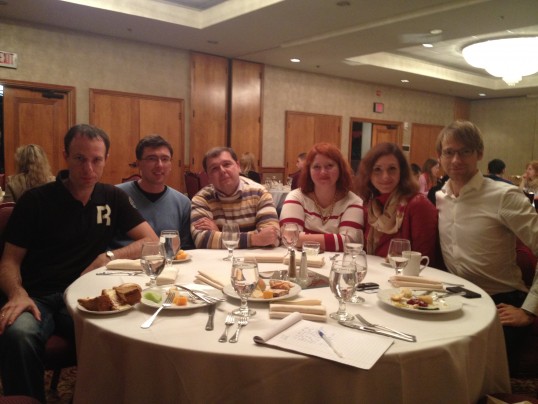
David A. Fahrenthold
.
The group had come all the way from Russia, part of a foreign-exchange program set up by Congress to show off the virtues of American democracy.
But when they got here, neither Congress nor American democracy was having its best day.
"No. No way,” said Ekaterina Ivanova, a TV journalist from Moscow, recalling her reaction when she heard what was going on.
For some reason, the legislators who had paid for her to visit had now shut down the government they wanted her to see. "It’s a joke,” Ivanova thought.
It wasn’t, of course. And so, on Day 10 of the government shutdown, among the many confused and displaced souls in Washington were 49 Russian educators, scientists and journalists brought here by the Open World Leadership Center, a kind of vanity project for Congress.
The mission of this 14-year-old program is to give foreign leaders, especially those from former Soviet republics, an up-close look at "America’s democratic, accountable government.”
The center is still functioning despite the shutdown, because Congress gave it funding that didn’t expire with the fiscal year. The center gets about $8 million a year from Congress, and so far it has survived efforts to kill it by budget-cutting House Republicans.
"We can basically keep operating for a few more weeks before we run out of money,” the center’s Maura Shelden said.
So on Thursday, the Russians went out to see the U.S. government.
Or, at least, the outside of it.
They couldn’t get very many meetings on the Hill, because a lot of congressional staff are on furlough. They couldn’t get into the museums. And, instead of hearing lectures on democracy inside the ornate (but closed) Library of Congress, the group heard them inside a rented function room at an Embassy Suites hotel near Dupont Circle.
The Russians did learn some things about America. Maybe not the things Congress intended.
"It’s effective, good democracy. But slightly weak,” said Dmitry Bespalov, a sports educator in the city of Kursk. "And I didn’t expect it to be weak.”
He cited Denmark and Finland as two countries doing a better job.
"This step, to shut down the government, is inconceivable,” said Ivanova, the journalist. She had not believed any legislators could be so fractious as to do this. Not even — and this will be a low blow for Congress — the French. "French people are said to be the most freedom-loving [people]. Even the French wouldn’t be able to do such things.”
Still, the Russians liked Washington itself. The city. In interviews with four of them, they said the capital was surprisingly green with trees, unlike big Russian cities. Washingtonians were very polite. And — even in a time when the government was supposed to be shut down — the streets were clean and the shops were open.
The shutdown felt like a holiday, they said, rather than a catastrophe.
Eduard Temnov, an educator from a city near Moscow, chuckled and told a joke in Russian. He had realized something: What he was witnessing in Washington wasn’t actually democracy!
It was actually a highly advanced vision of socialism. Here was what the old theorists had promised: a society functioning on its own, with no leaders in charge.
"Maybe you will come to communism soon!” he said. "No government . . . but people are still managing!”
The good news for the Russians is that they left Washington on Friday. For the next week, small groups of them will fan out across the country and observe local governments in action.
Temnov was going to see city leaders in San Antonio.
"Who are working!” he added.



_jpg/250px-ElbeDay1945_(NARA_ww2-121).jpg)





